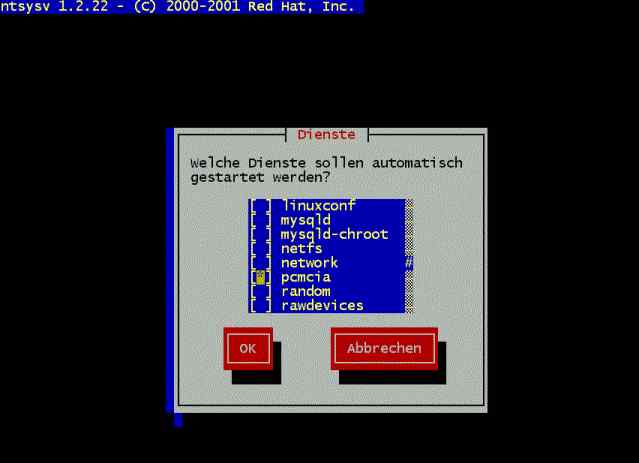 home
home manual & docs
manual & docs drivers & updates
drivers & updates software
software GNU/Linux
GNU/Linux Introduction
Introduction Read this
Read this What you need to know about the aero
What you need to know about the aero Partitioning the harddisk
Partitioning the harddisk Choosing the installation method
Choosing the installation method Preparing the Aero for a Red Hat 6.1 harddisk install
Preparing the Aero for a Red Hat 6.1 harddisk install The Red Hat 6.1 Installation Process
The Red Hat 6.1 Installation Process RAM-problems
RAM-problems The Floppy
The Floppy Access to DOS-Partitions
Access to DOS-Partitions The Linux-BootLoader
The Linux-BootLoader Configuring X-Windows
Configuring X-Windows Patching and compiling a new kernel
Patching and compiling a new kernel Solving the RAM problem
Solving the RAM problem Installing PCMCIA and configuring it for Bad RAM
Installing PCMCIA and configuring it for Bad RAM Finished - What comes next?
Finished - What comes next? Advanced Power Management
Advanced Power Management Getting WebDAV to work with XP
Getting WebDAV to work with XP Conclusion
Conclusion GNU Free Documentation License
GNU Free Documentation License FreeDOS
FreeDOS internal speaker
internal speaker the press
the press the people (& their mails)
the people (& their mails) the aeros wildest dream...
the aeros wildest dream... links
links about
about

PCMCIA
After recompiling a kernel you have also to recompile the pcmcia-cs package that makes pcmcia on the aero work - says David Hinds, the author of the package.
So now after the patching and compiling of a new kernel, pcmcia has to be installed new. I did that from a fresh tarball of the pcmcia-package.
First lets get rid of some ballast: The old kernel-pcmcia-cs-package, by default installed by RedHat, is no longer needed. So I uninstalled it first:
rpm -e kernel-pcmcia-cs
I then installed the original pcmcia package by downloading the package "pcmcia-cs-3.1.25.tar.gz" by David Hinds from:
http://prdownloads.sourceforge.net/pcmcia-cs/pcmcia-cs-3.1.25.tar.gz
Information about the installation can also be found in David Hinds Pcmcia-Howto at:
http://www.ibiblio.org/pub/Linux/docs/
HOWTO/other-formats/html_single/PCMCIA-HOWTO.html
I did choose this (older) package because the installation of the newest one (3.2.3) failed with RedHat 6.1 (think I need a new compiler version). I succeeded meanwhile with the newer package and RedHat 7.1. Anyway both packages worked great with the aero and both detect my network card correctly.
The installation went like
Copy the package into a directory f.i. /usr/src:
cp pcmcia-cs-3.1.25.tar.gz /usr/src
unpack the package
cd /usr/src/ tar xzpf pcmcia-cs-3.1.25.tar.gz cd /usr/src/pcmcia-cs-3.1.25 make config
In the configuration-menu you can select "No" for card-bus support The aero has only a standard 16-bit pcmcia-slot, so you cannot use the 32bit-card-bus.
make all make install
I then had to enable "pcmcia" as startup service in the Red Hat configuration tool "ntsysv".

There is also an configuration file that needs some settings:
/etc/sysconfig/pcmcia
On other systems it may be called /etc/pcmcia.conf.
The following settings worked for me:
PCMCIA=yes PCIC=i82365 PCIC_OPTS= CORE_OPTS=
The startup script for the service "pcmcia" lays in "/etc/rc.d/init.d/" so I had to change into that directory and command
./pcmcia
and use one of the then mentioned options (start, stop status, restart).
The BadRAM-options for the cardmgr
Then, according to Donald Gordon's mail, I also changed the the configuration file for the PCMCIA Card Manager.
It can be found at "/etc/pcmcia/config.opts"
I changed the lines
------------------------------------------- # System resources available for PCMCIA devices include port 0x100-0x4ff, port 0x800-0x8ff, port 0xc00-0xcff include memory 0xc0000-0xfffff include memory 0xa0000000-0xa0ffffff, memory 0x60000000-0x60ffffff -------------------------------------------
to:
------------------------------------------- # System resources available for PCMCIA devices include port 0x100-0x4ff, port 0x800-0x8ff, port 0xc00-0xcff include memory 0xb0000-0xb7fff -------------------------------------------
Now check for the available memory with the command:
dmesg | grep Memory

If the answer is like:
Memory: 18432k/20416k available (944k kernel code, 412k reserved, 548k data, 48k init, 32k badram)
you have exactly 19,9375 MB RAM available. OK, thats not all the 20 MB but the maximum possible. And on such a system I didn't encounter any mystery system hangs again and had further no problems with the detection and hot-plugging of my pcmcia-cards.
Comments
Suggestions for this page? Ideas? Please drop a note!
Don't forget to add your email, if you appreciate a personal reply.
The comments are sorted from date.